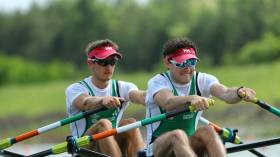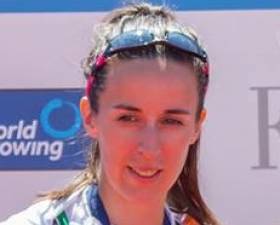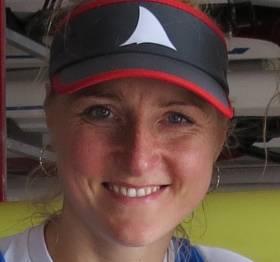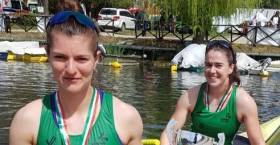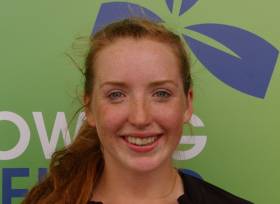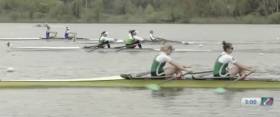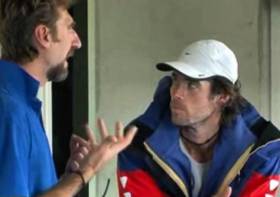Displaying items by tag: Ireland
#Rowing: Paul O’Donovan and Gary O’Donovan secured a semi-final place with second in their heat of the lightweight double sculls at the World Cup regatta in Belgrade. Patrick Keane and Maxwell Lattimer, the Canada Two crew, won the race. They fought off Portugal and then kept Ireland at bay, winning by 1.6 seconds.
World Cup Regatta, Belgrade (Irish interest)
Men
Pair – Heat Four (Winner to A/B Semi-Finals; rest to repechage): 1 Czech Republic 6:41.22; 2 Spain 6:48.03, 3 China One 6:51.79, 4 Ireland (M O’Donovan, S O’Driscoll) 6:51.91.
Lightweight Double Sculls – Heat Three (First two to A/B Semi-Finals; rest to repechage): 1 Canada Two 6:32.69, 2 Ireland (G O’Donovan, P O’Donovan) 6:34.29.
Women
Pair – Heat One (First Three to A/B Semi-Finals; rest to repechage): 1 Britain One 7:19.05, 2 Britain Two 7:22.92, 3 Ireland (A Keogh, E Hegarty) 7:23.77.
Double Sculls – Heat Three (First Three to A/B Semi-Finals; rest to repechage): 1 Netherlands 7:10.90, 2 China One 7:16.89, 3 Ireland (A Crowley, M Dukarska) 7:20.40.
Lightweight Double Sculls – Heat One (First two to A/B Semi-Finals; rest to repechage): 1 Britain One 7:26.96, 2 United States One 7:28.40; 5 Ireland (M Cremen, D Walsh) 7:50.34.
Single Sculls – Heat One (First Two to A/B Semi-Finals; rest to repechage): 1 Ireland (S Puspure) 7:50.48, 2 Ukraine (D Dymchenko) 7:59.30.
Walsh and Cremen Set for Repechage at World Cup
#Rowing: Denise Walsh and Margaret Cremen finished fifth in their heat of the lightweight double sculls at the World Cup Regatta in Belgrade and must compete in a repechage as they seek a semi-final place. There were just two places on offer in the heat and Britain One and the United States One asserted control early on and took them in that order. Ireland found themselves behind four crews from early on in the race and the order did not change.
World Cup Regatta, Belgrade (Irish interest)
Men
Pair – Heat Four (Winner to A/B Semi-Finals; rest to repechage): 1 Czech Republic 6:41.22; 2 Spain 6:48.03, 3 China One 6:51.79, 4 Ireland (M O’Donovan, S O’Driscoll) 6:51.91.
Women
Pair – Heat One (First Three to A/B Semi-Finals; rest to repechage): 1 Britain One 7:19.05, 2 Britain Two 7:22.92, 3 Ireland (A Keogh, E Hegarty) 7:23.77.
Double Sculls – Heat Three (First Three to A/B Semi-Finals; rest to repechage): 1 Netherlands 7:10.90, 2 China One 7:16.89, 3 Ireland (A Crowley, M Dukarska) 7:20.40.
Lightweight Double Sculls – Heat One (First two to A/B Semi-Finals; rest to repechage): 1 Britain One 7:26.96, 2 United States One 7:28.40; 5 Ireland (M Cremen, D Walsh) 7:50.34.
Single Sculls – Heat One (First Two to A/B Semi-Finals; rest to repechage): 1 Ireland (S Puspure) 7:50.48, 2 Ukraine (D Dymchenko) 7:59.30.
Puspure Opens With Commanding Win at World Cup Rowing
#Rowing: Sanita Puspure booked her places in the semi-finals of the World Cup in Belgrade with a commanding win in her heat. The Ireland single sculler had a slight lead by the 500 metre mark over Diana Dymchenko of the Ukraine. Puspure extended her advantage by halfway and then moved clear in the second 1,000 metres. Carling Zeeman of Canada tried to push into the second – and final – qualifying spot but could not get past Dymchenko, who finished almost nine seconds behind Puspure.
World Cup Regatta, Belgrade (Irish interest)
Men
Pair – Heat Four (Winner to A/B Semi-Finals; rest to repechage): 1 Czech Republic 6:41.22; 2 Spain 6:48.03, 3 China One 6:51.79, 4 Ireland (M O’Donovan, S O’Driscoll) 6:51.91.
Women
Pair – Heat One (First Three to A/B Semi-Finals; rest to repechage): 1 Britain One 7:19.05, 2 Britain Two 7:22.92, 3 Ireland (A Keogh, E Hegarty) 7:23.77.
Double Sculls – Heat Three (First Three to A/B Semi-Finals; rest to repechage): 1 Netherlands 7:10.90, 2 China One 7:16.89, 3 Ireland (A Crowley, M Dukarska) 7:20.40.
Single Sculls – Heat One (First Two to A/B Semi-Finals; rest to repechage): 1 Ireland (S Puspure) 7:50.48, 2 Ukraine (D Dymchenko) 7:59.30.
#Rowing: Ireland’s women’s double scull of Aileen Crowley and Monika Dukarska qualified directly for the semi-finals of the World Cup in Belgrade this morning. They took the third of the three places of offer in their heat. The Netherlands won well and China One, who had led in the first quarter, took second. Dukarska and Crowley were third through most of the race but had just 3.4 seconds to spare over Switzerland at the finish line.
World Cup Regatta, Belgrade (Irish interest)
Men
Pair – Heat Four (Winner to A/B Semi-Finals; rest to repechage):
1 Czech Republic 6:41.22; 2 Spain 6:48.03, 3 China One 6:51.79, 4 Ireland (M O’Donovan, S O’Driscoll) 6:51.91.
Women
Pair – Heat One (First Three to A/B Semi-Finals; rest to repechage): 1 Britain One 7:19.05, 2 Britain Two 7:22.92, 3 Ireland (A Keogh, E Hegarty) 7:23.77.
Double Sculls – Heat Three (First Three to A/B Semi-Finals; rest to repechage): 1 Netherlands 7:10.90, 2 China One 7:16.89, 3 Ireland (A Crowley, M Dukarska) 7:20.40.
#Rowing: Mark O’Donovan and Shane O’Driscoll took fourth in their heat of the pair at the World Cup Regatta in Belgrade this morning. Only the winner nailed down a place in the semi-final and the Czech Republic took this after a battle with Spain. Well behind them, China One won their battle with O’Donovan and O’Driscoll.
The Irish, the world champions in the lightweight pair, are hoping to establish themselves as a heavyweight pair. They were 13th of the 22 contenders on time.
World Cup Regatta, Belgrade (Irish interest)
Men
Pair – Heat Four (Winner to A/B Semi-Finals; rest to repechage):
1 Czech Republic 6:41.22; 2 Spain 6:48.03, 3 China One 6:51.79, 4 Ireland (M O’Donovan, S O’Driscoll) 6:51.91.
Women
Pair – Heat One (First Three to A/B Semi-Finals; rest to repechage): 1 Britain One 7:19.05, 2 Britain Two 7:22.92, 3 Ireland (A Keogh, E Hegarty) 7:23.77.
#Rowing: Ireland’s new pair of Emily Hegarty and Aifric Keogh put in a decisive sprint in the final 200 metres to take a crucial third place in their heat at the World Cup Regatta in Belgrade this morning. Britain took the first two qualification places for the semi-finals. For much of the race, Serbia held third, with Ireland lagging behind by over a length in fourth and set to go to a repechage. However, Ireland finished well and passed the hosts.
World Cup Regatta, Belgrade (Irish interest)
Women
Pair – Heat One (First Three to A/B Semi-Finals; rest to repechage): 1 Britain One 7:19.05, 2 Britain Two 7:22.92, 3 Ireland (A Keogh, E Hegarty) 7:23.77.
Cork Welcomes Coupe de la Jeunesse 2018
#Rowing: The Coupe de la Jeunesse will be hosted by Ireland this year. Young rowers from Austria, Belgium, Czech Republic, Denmark, France, Great Britain, Hungary, Italy, the Netherlands, Poland, Portugal, Spain, Switzerland and all across Ireland will compete at the National Rowing Centre from July 27th to 29th.
The Coupe de la Jeunesse is an annual international junior rowing regatta. The event, which was founded in 1985, is open to rowers 18 years or under. Points are awarded to nations based on finishing position in each category. As a result, a strong overall team is required to take overall victory at the Coupe. The event has only ever been won by Britain (14 wins), Italy (11 wins), and France (8 wins). Each category is raced separately on the first and second day of the regatta, allowing for different Coupe de la Jeunesse event winners on each day.
Ireland performed exceptionally well last year, highlighting our young talent in this growing Irish sport, bringing home a total of five gold medals across the women’s pair and men’s quadruple categories.
Rowing Ireland has been a proud member of the Coupe rowing family for many years and hosted this event in 1999 and 2008. The regatta, which encourages young rowers, has become a platform in Ireland for starting the international careers of some of our most successful and decorated Irish rowers such as Gary O’Donovan and Shane O’Driscoll.
Cork County Council is supporting the event. During his welcoming address, County Mayor Declan Hurley has urged those taking part in the Coupe de la Jeunesse to take the opportunity to explore Cork during their downtime.
“I would like to welcome all the visiting athletes, their coaches, families and supporters to our great county and commend these young rowers for the hard work, passion and dedication that has brought them here. While this is a competition, I wish to remind all participants to take some time to enjoy all that this county has to offer. Cork is truly a remarkable place with so much to do, see and experience. Go and kiss the Blarney Stone; take a trip on the Dursey Island Cable Car, running 250m above the sea; visit Mizen Head, the most south-westerly point in Ireland or sample some mouth-watering Cork artisan produce. There is so much to do in our beautiful county, I hope you enjoy each and every minute.”
Michelle Carpenter, the new chief executive of Rowing Ireland, said: “We are so excited to welcome young rowers from 13 countries across Europe to our fantastic home here at the National Rowing Centre in Farran Wood this July. To have the pleasure of announcing Ireland as host of this prestigious race as one of my first roles in my new position as CEO is such an honour. This is an event which I hold dear to my heart as I have been heavily involved in the Coupe for the last four years and have witnessed first-hand what a great opportunity this is for up and coming young rowers to grow.
“Rowing is such a historic sport, but beyond that, its reliance on teamwork and seamless synchronization forms bounds of friendship and family that really stand the test of time. If you can battle the waters together, you can achieve anything! I cannot wait for Cork to open its arms once again to the visiting Coupe family. While rowing is where the excitement lies, competitors and their families are always blown away by Cork’s friendliness, culture and scenic nature. I have no doubt our great county will pull out all stops, as always, to support our competitors, both home and foreign, this July.”
Young Irish athletes are competing to secure a place on the 2018 Coupe de la Jeunesse team. A crucial trial is taking place on Friday 18th May, after which the selection panel will review these young rowers’ performances, and also take into account their previous rowing history.
The National Rowing Centre in Farran Wood acts as the base for the Ireland high performance team. The course facilities have been upgraded in recent years and now consist of an Albano course with adjustable start, split timing and photo finish system.
Puspure and Dukarska Team Up to Take Sculling Bronze
#Rowing: Sanita Puspure and Monika Dukarska teamed up in a double to take a bronze medal at the Memorial Paolo d’Aloja in Italy today. The Ireland crew led early on and stayed in the mix as Lithuania took over the lead. In a dash for the line, Ireland and South Africa fought it out for silver, with the South Africans just taking it.
Ireland had earlier taken a medal in the single sculls through Emily Hegarty, who also took bronze.
Memorial Paolo d’Aloja International Regatta, Piediluco, Italy (Irish interest)
Sunday
Women
Double Sculls – A Final: 1 Lithuania 7:07.04, 2 South Africa 7:09.36, 3 Ireland (S Puspure, M Dukarska) 7:09.88.
Single Sculls – A Final: 1 Ukraine (D Dymchenko) 7:52.35, 2 Lithuania (L Saltyte) 8:11.90, 3 Ireland (E Hegarty) 8:14.76.
Crowley and Dukarska Win in Double in Italy
#Rowing: Ireland’s Monika Dukarska and Aileen Crowley took gold at the Memorial Paolo d’Aloja regatta in Piediluco in Italy this morning. The new double proved better than two Italian crews in a three-boat final. Sanita Puspure had to settle for silver in the women’s single, losing out to Diana Dymchenko of the Ukraine, while the women’s pair of Aifric Keogh and Emily Hegarty finished fifth in their six-boat final.
Memorial Paolo d’Aloja International Regatta, Piediluco, Italy (Irish interest)
Women
Pair – A Final: 5 Ireland (A Keogh, E Hegarty) 7:45.96.
Double Sculls – Final: 1 Ireland (M Dukarska, A Crowley) 7:13.93.
Single Sculls – A Final: 1 Ukraine (D Dymchenko) 7:38.04, 2 Ireland (S Puspure) 7:38.55, 3 Lithuania (M Valciukaite) 7:41.88.
David McGowan Chosen as New Ireland Heavyweight Coach
#Rowing: David McGowan from Australia will be the new Ireland heavyweight coach. As an athlete he competed in the Australia four which finished fourth in the Olympic Games in Athens in 2004. As a coach he had a successful run in the Netherlands. He coached the lightweight eight to gold at the World Championships in 2007, then took the men’s heavyweight eight through the Olympic Qualifiers in 2008 and they went on to the Beijing Olympic Games. He coached with Nereus, the famed student club from Amsterdam and in Sweden. Most recently, he was appointed head coach at Swan River Rowing Club in Perth in Australia.
He will take up his post next month and will be expected to create a pathway for Irish rowers from junior and university levels on to the Ireland high performance system.
In a statement from Rowing Ireland, McGowan said: “I feel privileged to have been offered this opportunity in such an exciting time for Irish rowing. I look forward to both working with Rowing Ireland and rowing in Ireland and I am excited to be joining the team shortly.”
Rowing Ireland chief executive, Hamish Adams, added: “We are delighted to have secured the services of an experienced international coach like David and I believe he will deliver real value to our heavyweight programme across the island of Ireland. Development of the heavyweight category offers a great opportunity to us as a rowing nation and we feel it is important to engage with all our stakeholders to deliver on our potential in this area.”


























